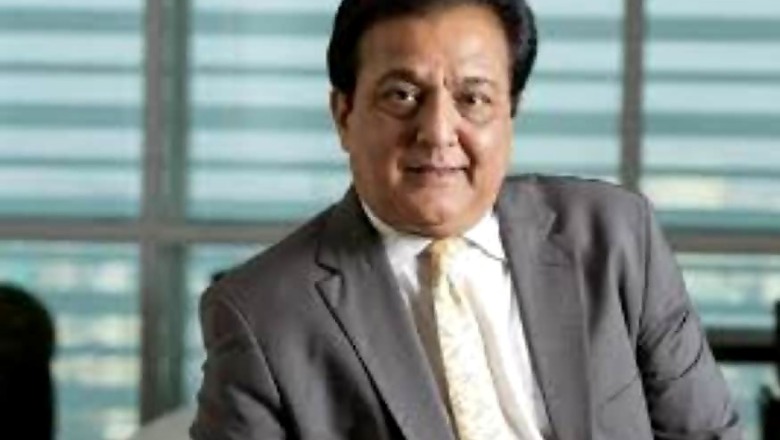
views
New Delhi: Yes Bank’s Rana Kapoor is in talks with Paytm to sell his stake and that of his family’s in the bank he cofounded.
Kapoor looks at exiting Yes Bank to Vijay Shekhar Sharma, the founder and CEO of the Noida-based mobile payments startup backed by Japan’s Softbank, for up to Rs 2,000 crore. Kapoor and his family hold 9.64% stake in Yes Bank of which 69% is pledged with Reliance Nippon Asset.
Negotiations on the price and the other issues are on, said a Moneycontrol report. 62-year-old Kapoor and his family members shares are worth Rs 1,550 crore.
On Monday, Yes Bank’s shares closed 4.5 percent higher at Rs 63.10 on the National Stock Exchange (NSE). The benchmark Nifty index rose by 0.52 percent and the Bank Nifty index, of which Yes Bank is a part, closed 0.94 percent higher. The stock markets are closed on September 10 for Muharram.
The report says that if the deal goes through, it will mark the end of the career of one of India’s most-storied bankers and the potential rise of an upstart serial entrepreneur in the banking sector.
Kapoor’s fortunes have been shrinking for the past few years. In 2015, he lost a court battle to co-promoter Madhu Kapur over a board appointment and was eventually ousted as the CEO and MD of Yes Bank by the Reserve Bank of India, which cited “serious lapses” in governance and a “poor compliance culture.”
Sharma, 41, has been intensely raising money. He is one of India’s earliest startup entrepreneurs who founded mobile content company One97 Communications in 2000.
His company One97, which operates Paytm, has taken in $2.3 billion (Rs 16,500 crore at current exchange rates) from investors including Softbank, Alibaba and Warren Buffett's Berkshire Hathaway. It is valued at an estimated $15 billion. In addition to the eponymous payments app, his firm operates an e-commerce marketplace as well as Paytm Payments Bank.
Kapoor's family owns stakes in Yes Bank both directly and through investment firms Yes Capital and Morgan Credits. His daughters Rakhee, Roshni and Radha are directors of the investment companies.
Earlier, Kapoor had pledged his entire stake as also that of Morgan Credits to Reliance Nippon Life Asset Management, an Anil Ambani-promoted company, for Rs 1,500 crore. He has repaid 30 percent of the amount. “He has taken consent from Reliance to sell the shares, pay back the money owed to Reliance Nippon, and keep whatever he makes on top of it,” a second source said.
That is do-able, said Amarjit Chopra, a chartered accountant and senior partner at GSA and Associates. “If both parties--the pledger and the lender--are in agreement, the sale of the shares can happen,” he said.
Kapoor wants to sell the unpledged shares of Yes Capital, which own 2.97 percent in Yes Bank. The money that will be left after paying back Reliance Nippon will remain with Kapoor and his family. “Rana Kapoor’s exit will also end the long-time family feud between him and Madhu Kapur,” a third source said.
The total promoter holding in Yes Bank is at 17.97 percent, with Rana Kapoor and his family owning 9.64 percent and Madhu Kapur and her family (her son Gaurav and daughter Shagun) owning 8.33 percent. Kapur is the widow of Ashok Kapur, who was the co-founder and chairman of the bank. The Kapur family is expected to retain its holdings in the bank.
But, the deal is far from done. “Sharma is evaluating the pros and cons of the deal. There are a lot of complexities, especially with promoter shareholding in banks,” one of the sources said. “There are a lot of regulatory challenges, including ownership shareholding that Sharma will have to evaluate.”
This will be the first time that a fintech company, or its promoter, will buy a sizable stake in a commercial bank. In the past, Axis Bank acquired FreeCharge (from Snapdeal), HDFC launched its own fintech startup accelerator programme and ICICI bought a 9.9 percent stake in ePayLater.
Sharma, a source said, is also evaluating how much more money he will have to invest to restore the bank, which has lost 80 percent its market value in the past year. “Estimates are that the bank would need anything between Rs 7,000 crore and Rs 9,000 crore. To raise that money the bank will have to issue new shares,” this person said. Yes Bank is said to have plans to raise $1.2 billion, excluding the Rs 1,930 crore it had raised through a Qualified Institutional Placement.
A mail to Yes Bank’s public relations team did not elicit any response on plans for new shares.
Issuing new shares for Sharma to pour in more funds might be a problem considering the RBI wants to promoters to own not more than 15 per cent in banks.
“It involves a lot of money for Sharma to take a plunge all by himself. He will have to bring in additional investors if he has to raise money for the bank beyond buying Kapoor’s share,” one of the sources said.




















Comments
0 comment